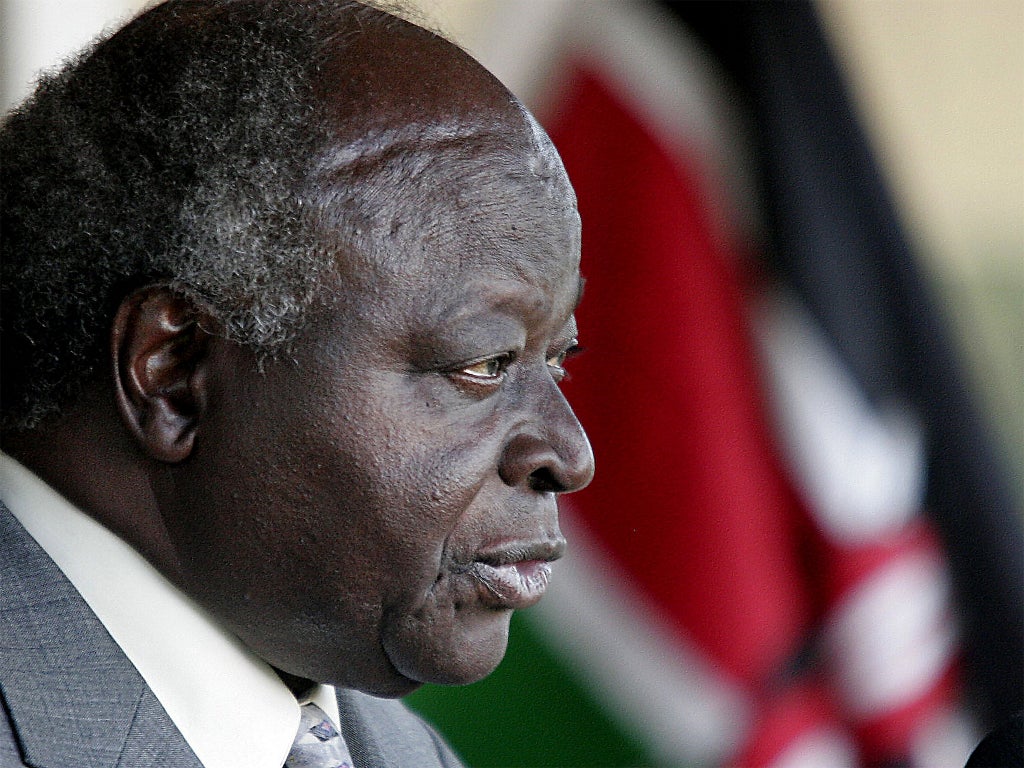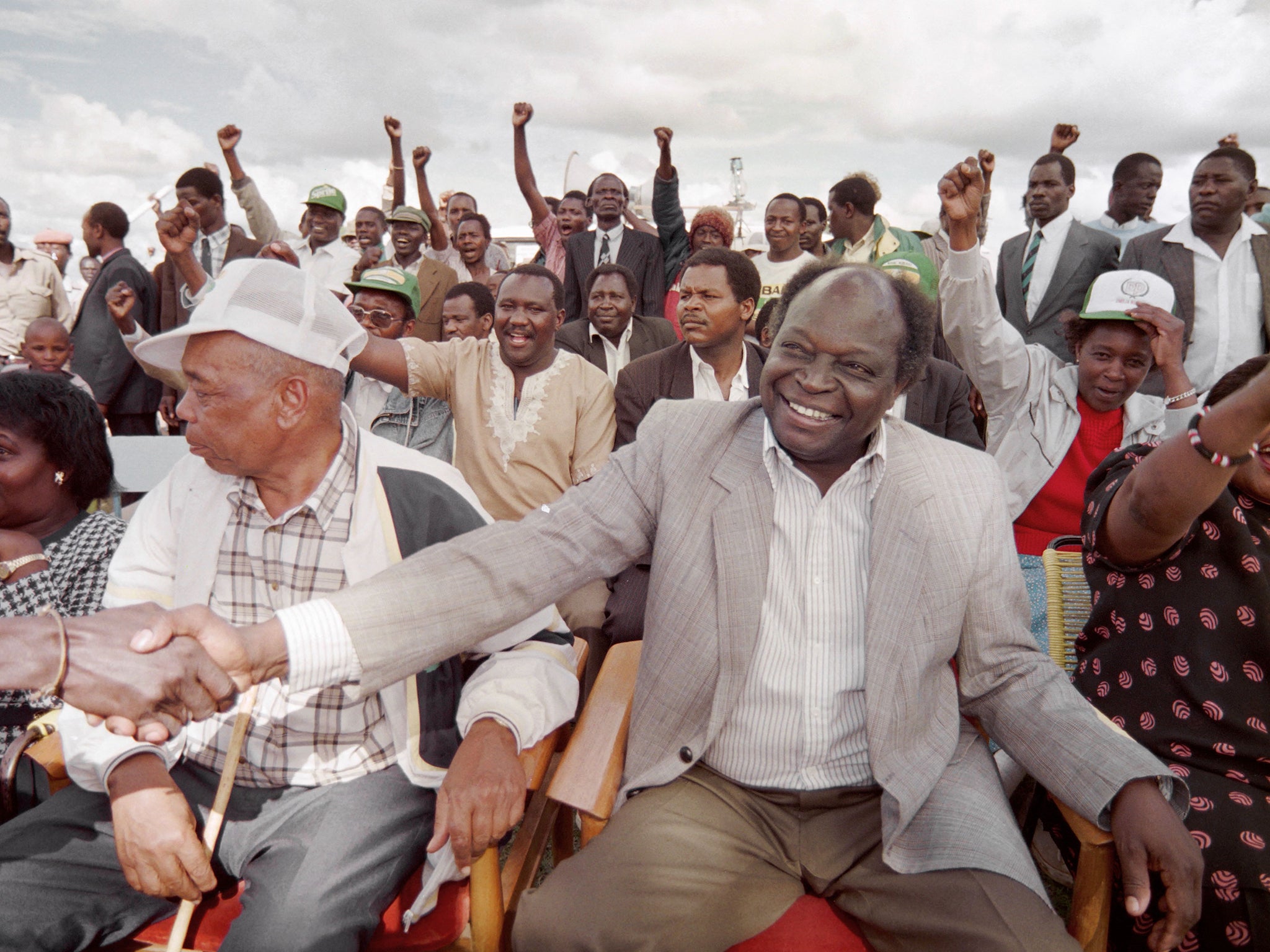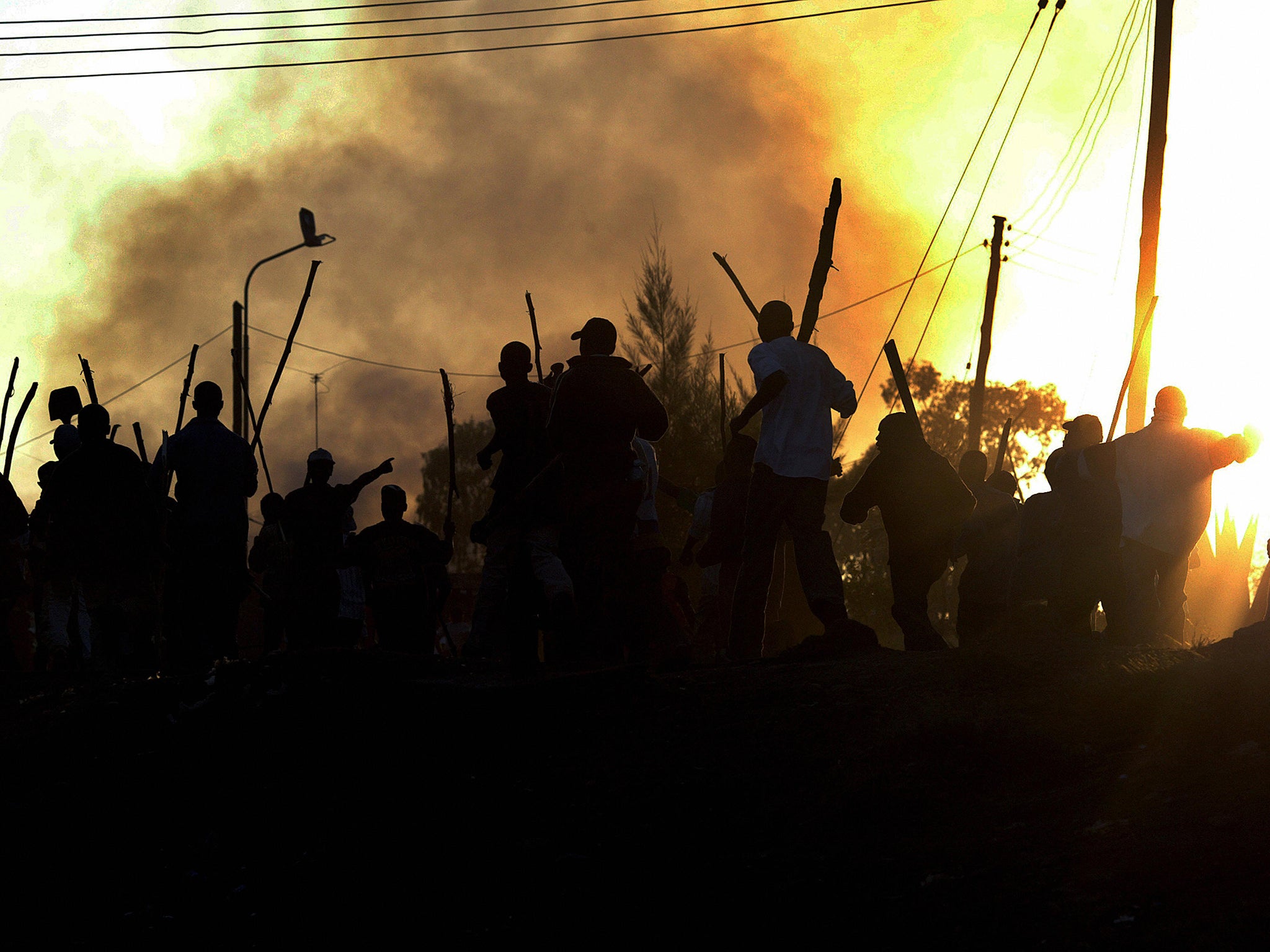
Mwai Kibaki, who brought an end to decades of one-party rule when he was elected president of Kenya in 2002, only to have his promises to end government corruption undermined by accusations of graft and by violence surrounding his re-election bid, has died aged 90.
Kibaki was the last Kenyan president who was part of the generation that led the country from British colonial rule to independence in 1963. He helped draft the country’s first constitution and was an early member of the Kenya African National Union (Kanu) party, which dominated Kenyan political life for 39 years.
Kibaki was elected to Kenya’s first parliament after independence and held several government posts, each more powerful than the last, over the next 25 years. A London-trained economist and onetime professor, Kibaki became minister of finance and economic planning in 1970 under Kenya’s first president, Jomo Kenyatta.
After Kenyatta’s death in 1978, his vice president, Daniel arap Moi, assumed the presidency and chose Kibaki as vice president. Moi followed Kenyatta’s pattern of increasingly authoritarian rule, self-enrichment and widespread corruption. Ordinary citizens struggled with poverty, poor education and a shoddy healthcare system.
Kibaki began to break with Moi in the early 1980s, when other political parties were outlawed following an attempted coup. In 1988, Moi demoted Kibaki from vice president to minister of health. In that role, Kibaki led efforts to reduce the spread of HIV/Aids in Kenya by launching education efforts and treatment programmes.
In the meantime, international companies and lending organisations began to demand reform in a country that had become a corrupt one-party state. Moi’s autocratic tendencies were visible in the presidential portraits that hung on the walls of stores, on the roads that bore his name and on the country's currency, which featured his likeness.
Late in 1991, opposition political parties were legalised, and soon afterwards Kibaki left his government post to launch the new Democratic Party. He challenged Moi for presidency in 1992 and 1997, losing both times in elections that outside observers said were rife with voting irregularities.
In 2002, with Moi unable to stand for re-election because of term limits, Kibaki ran as the leader of a new party called the National Rainbow Coalition. He pledged to make primary education for children free and to provide universal health care. Moreover, he vowed to end the widespread bribery and graft that affected every level of Kenyan life, from obtaining a telephone to appearing before a judge.

On 3 December 2002, a little more than three weeks before the election, Kibaki was injured in a car accident and was flown to London for treatment – an act that highlighted the need for improved medical services in Kenya. When he returned after 10 days, he campaigned from a wheelchair.
Jubilation broke out across the country when he won 63 per cent of the vote. Moi’s chosen successor, Uhuru Kenyatta – the son of the country's first president – finished a distant second. To the surprise of many, Moi did not challenge the result and quietly ceded his office to Kibaki.
“I am inheriting a country which has been badly ravaged by years of misrule and ineptitude,” Kibaki said during his inaugural address. “You have asked me to lead this nation out of the present wilderness and malaise on to the promised land, and I shall do so.”
At first, he made good on his campaign rhetoric by improving access to education and launching efforts to reduce corruption in the courts. He also sought to reform the country’s banking system, which led to the resignation of several top officials.
Kibaki was swept into office by support from a multiethnic coalition, not just members of his own Kikuyu people, the largest ethnic group in the country. But tribalism remained a strong element of Kenyan politics, and he surrounded himself with a close-knit cadre of his fellow Kikuyus, whose traditional homeland was near Mount Kenya.
His inner circle became known as the Mount Kenya Mafia, and in short order Kibaki faced criticism for the same cronyism and kickbacks he had decried in his predecessors.
Kibaki, who had worked in government for his whole life, became one of Kenya’s wealthiest people and was embarrassed by revelations that, in addition to his wife and four children, he had a second family with another woman.
In 2005, his top anti-corruption watchdog, John Githongo, resigned, saying he faced death threats and had been thwarted in his attempts to investigate government officials in Kibaki’s orbit.

Kenyans quickly became disillusioned with Kibaki's leadership, and in 2007 he faced a strong re-election challenge from Raila Odinga. Odinga was leading in the early returns, but election officials stopped releasing vote tallies, blocked journalists from reporting on the results and declared Kibaki the winner. He was swiftly sworn in as president on election night.
Election observers from the EU charged that the results “lacked credibility” and suffered from “a lack of transparency”. Violence erupted throughout the country, and Kenya teetered on the brink of civil war, with more than 1,100 people killed.
In 2008, Kofi Annan, former secretary general of the United Nations, stepped in to broker a power-sharing deal in which Kibaki would stay on as president while his rival, Odinga, would become prime minister.
Under this somewhat uneasy arrangement, a new constitution was approved in 2010, limiting some presidential powers and strengthening ethics provisions.
Kibaki resigned his office in 2013 but not before receiving a generous retirement package that allowed him to live in luxury in his Nairobi apartment and at his country estate.
Mwai Emilio Stanley Kibaki was born on 15 November 1931, in Gatuyani, a village near Mount Kenya. His parents were tobacco and cattle farmers.
An excellent student, Kibaki won a scholarship to Makerere University in Kampala, Uganda, where many future leaders from throughout Africa were educated. He graduated in 1955 and then received a degree in economics and public finance from the London School of Economics in 1958. During that time, one of his brothers was killed while fighting in a revolutionary guerrilla movement in Kenya.
Kibaki taught at Makerere for several years and became active in Kenya’s growing independence movement. In a 2002 interview with the Christian Science Monitor, he recalled joining some friends at a bar in Nairobi.
“During our conversation,” he said, “one of us suggested that we draw a constitution for the future. So, we borrowed stationery from the counter and started drafting.”
He also helped organise the Kanu party, which propelled Kenyatta to power.
In 1962, Kibaki married Lucy Muthoni, who died in 2016. They had four children. He also had a long relationship with Mary Wambui, with whom he had a daughter.
It is unclear whether they were married – polygamy is legal in Kenya – but Mary Wambui received VIP treatment while Kibaki was president and, for several years, held his old seat in the Kenyan parliament.
Mwai Kibaki, politician and former president of Kenya, born 15 November 1931, died 21 April 2022
© The Washington Post







